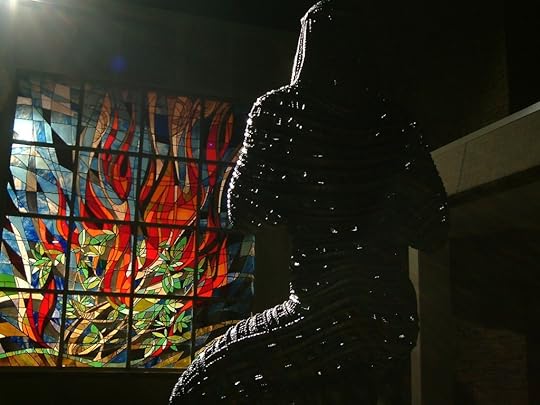Week 3, Day 5: Beyond the Self
But Moses said to God, “If I come to the Israelites and say to them, ‘The God of your ancestors has sent me to you,’ and they ask me, ‘What is his name?’ what shall I say to them?” God said to Moses, “I am who I am.” He said further, “Thus you shall say to the Israelites, ‘I am has sent me to you.’” (Exodus 3:13-14)
 Moses and the Burning Bush, by Richard Simon, from Wikimedia Commons
Moses and the Burning Bush, by Richard Simon, from Wikimedia CommonsRene Descartes’ most famous quote is “I think, therefore I am.” His thought experiment involved questioning his perceptions of the world until he came to something he couldn’t deny: in order to have thoughts, there must be a thinker. There is an irreducible “I.” But consciousness is so slippery that researchers question even this “self-evident” truth. The thinking brain is less like an “I” and more like a committee!
In this series, I’ve been following a trail about consciousness: I am not my perceptions (week 1). I am not my thoughts or behaviors (week 2). I am not the story I tell myself about myself (week 3). What am I, exactly? What is this thing that believes it is thinking and experiencing?
Is it possible to have consciousness without a self at all? To experience “pure consciousness?” Some experienced meditators and psychedelic psychonauts describe such a state, where the self disappears and we feel connected to all things. We can use a magnetic field (fMRI machines) to look at brain activity and see that there are places in the brain that get quiet when people have such experiences. These brain systems maintain a separation between “I” and others and the rest of the world. With regular meditation, I can train these brain systems to relax.
Some refer to this experience as “ego death,” and report a variety of benefits from it: an increase in the feeling of awe at simple things; an ability to re-author the story I tell about myself; an enduring or residual feeling of connectedness to the universe and community of all living things. The “death” itself can be terrifying and disorienting, and it can lead to adverse effects for both meditators and psychonauts. (I have to point out that I’ve met more than a few meditators and psychonauts who’ve experienced “ego death” who have grandiose egos.)
A lot of psychotherapy involves helping people to understand that you are not your thoughts. Thoughts emerge from the matrix of your firing neurons, and then they subside. We can sometimes be fooled into believing whatever we think: “Nobody loves me,” “It’s pointless to try,” and so on. Sometimes it be difficult to divest from these thoughts because as false and painful as they are, they maintain a consistent sense of self. Losing the self can feel like death.
I consider God’s own name to be an affirmation of pure consciousness: “I AM.” God is the one in whom we live and move and have our being, and there is nothing outside this “I AM” which is separate from God. Moses the shepherd has a revelation of God’s name as he stands in front of a burning bush. There’s a similar revelation of God’s character as shepherds kneel beside the manger. The Christmas story describes a bridge between the flame and the breathing infant opening eyes on the world for the first time.
Prayer: Great I AM, I barely know what I am, but I long to know you better.



